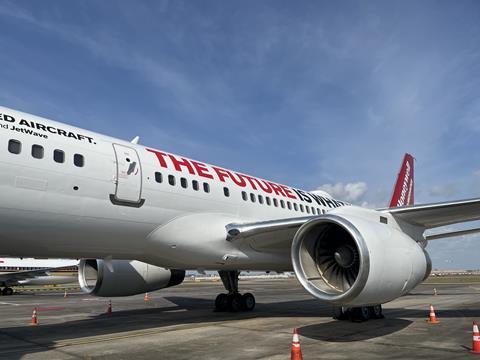Honeywell is exploring separating Honeywell Aerospace Technologies into a standalone business under pressure from minority stakeholder Elliott Investment Management.
In a 16 December update from the board of the US conglomerate, Honeywell says that it is undertaking at the direction of chief executive Vimal Kapur a “comprehensive portfolio evaluation of alternatives for unlocking shareholder value”, including possibly spinning off its aerospace unit.
Elliott, which holds a $5 billion stake in Honeywell, is pushing for such a change as it seeks greater returns.
Honywell says the concept has progressed significantly in recent weeks, as it expects to deliver an update alongside its fourth quarter financial report next month. Kapur says the company is considering “transformational changes” as it aligns with the “mega trends” of automation, the energy transition and future flight technologies.
”Since aligning our business this past January… we have been moving swiftly and decisively to optimise the Honeywell portfolio to deliver superior growth and drive incremental shareholder value,” he says.

Honeywell has already signalled its intention to spin off its advanced materials unit into a separate business and agreed to divest its personal protective equipment business, with its aerospace unit seemingly next in line.
The move would mirror that of GE Aerospace, which in April completed its long-planned divestiture from the once-mighty US conglomerate General Electric.
Phoenix-based Honeywell Aerospace Technologies produces a range of propulsion, flight control and avionics technologies. The manufacturer says that its aerospace portfolio is among the world’s “broadest and most innovative… spanning take-off to landing”, with defence, urban air mobility, air cargo, business jet, helicopter and space segments.
Honeywell reported making a roughly $1 billion profit with its aerospace unit in the third quarter, a 12% increase over the prior-year period, as it generated about $3.9 billion in sales.
”Commercial aftermarket saw another quarter of strong growth as global flight activity rises,” Honeywell said at the time. “Defence and space sales increased 14% organically in the third quarter due to robust demand and supply chain improvements.”
Eliott says that it welcomes the company’s strategic review and the potential separation of Honeywell Aerospace Technologies.
”We believe the portfolio transformation Vimal and his team are leading represents the right course for Honeywell, and we look forward to the upcoming completion of the review and to supporting Honeywell as it implements the necessary steps to realise its full value,” the firm says.
Earlier this year, Elliott targeted Southwest Airlines with an aggressive campaign to turn around sagging financial performance. For months, the investment company pressured Southwest to make wholesale changes to its leadership team and business model.
Resistance from the Dallas-based company’s broke down in September with the departure of former board chair Gary Kelly and a shake-up of its board of directors. Southwest chief executive Bob Jordan remains in his position despite Elliott pushing for his departure, however.































